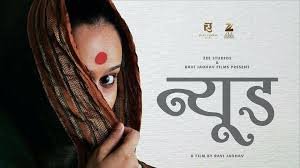As first reported by Live Law here, the Tiz Hazari court, Delhi has granted an ex-parte ad interim injunction on release of the Marathi film ‘Nude’ in a suit filed by writer Manisha Kulshreshtha alleging that the film is a substantial adaptation with the same storyline, plot, form and manner of expression including the name of the protagonist as that of her Hindi story ‘Kalindi’.
The writer claims to have written her short story in 2007 and it was first published in a journal in 2008 and then in 2011 in a book named Gandharv Gatha. The story revolves around a poor woman who models for students of art without her family knowing about it.
The counsel for the plaintiff showed the official trailer to the court of the film to press home his point that it is a substantial adaptation of the Plaintiff’s short story.
The Court has restrained the release of the film till the next date of hearing. The matter is next listed on April 19, 2018
The film has been granted certification by the CBFC and is scheduled to be released on April 27, 2018.
The Court seems to have granted the ad-interim injunction merely on the basis of the trailer of the film without recording the list of substantial similarities between the Plaintiff’s works and the underlying works of the Defendant’s film and as to how the Plaintiff has satisfied the tests of there being a prima facie case, balance of convenience in its favour and irreparable loss which would be caused should the injunction not be granted.
It would have to be seen in the next date of hearing if the Defendant is able to show the dissimilarities between the underlying works of its film and the Plaintiff’s work. Since there is still time for the film to release and the trailer of the film seems to have launched only in March end, delay and laches may not be available as a defence unless the defendant is able to show that the Plaintiff ought to have approached the court at an earlier stage.
In the case of XYZ Films LLC vs UTV Motion Pictures/ UTV Software Communications Ltd and ors, the Plaintiff had sought an injunction on the film ‘Baaghi’ based on its trailer by which they were alarmed that there are apparent similarities between their film ‘The Raid Redemption’ and the defendant’s film ‘Baaghi’, particularly in relation to a fight sequence in the film. The Court had gone into viewing both the films and its scripts and comparing the two. Justice Patel had held that the Plaintiff’s copyright does not subsist in any so called ‘central’ theme or concept. It subsists only in the particular realization of it; and if that is not copied, and the rival work is wholly different, there is no infringement. “I must agree with this view that there is, generally speaking, no copyright in the central idea or theme of a story or a play. It subsists in a combination of situations, events and scenes which, working together, form the realization or expression of that idea or theme. If this combination is totally different and yields a completely different result, the taking of the idea or the theme is not copyright infringement”. He had further held, “While copying, i.e., infringement necessarily implies similarity, the converse is not true: mere similarity does not always and in and of itself imply or impute copying; at least not always sufficient to support a finding of infringement.” The court had refused to do a scene by scene dissection in that case and looked at the film as a whole.
Whether the film ‘Nude: Chitra” has been plagiarized from the Plaintiff’s works would depend on whether there is substantial similarity in the underlying works of the film and the Plaintiff’s work as a whole.
A list of such cases in which writers have claimed infringement of their underlying works can be viewed here in the Judgement section.
Image source: here













